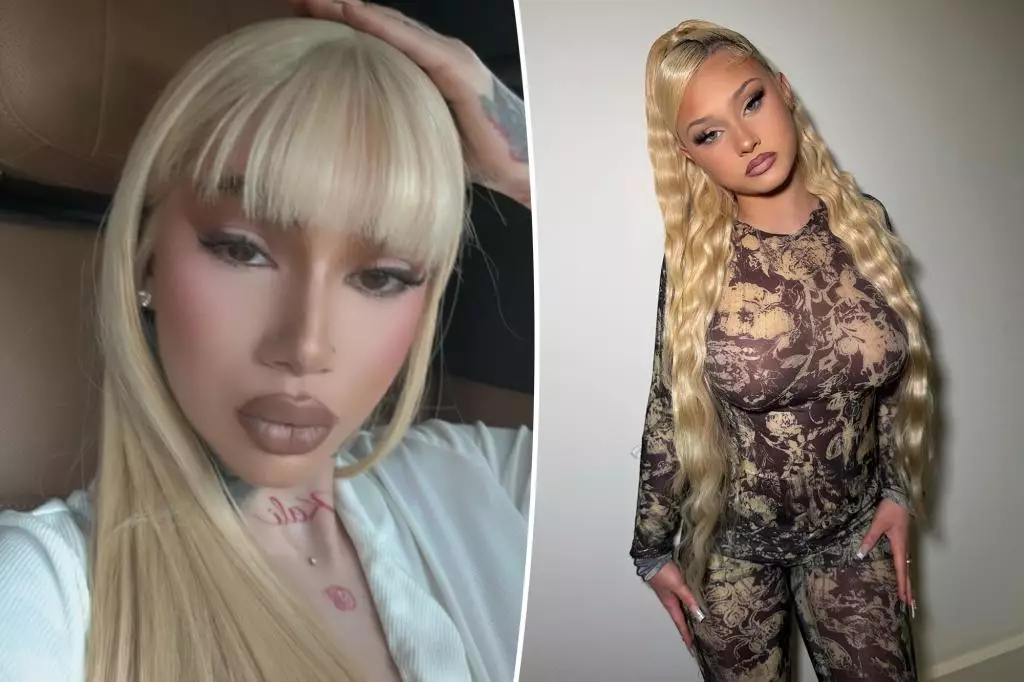In the world of celebrity feuds, few manage to captivate the audience quite like the recent spat between Bhad Bhabie, born Danielle Bregoli, and Alabama Barker, daughter of rock star Travis Barker. This turmoil began in December when Bhad Bhabie accused Alabama of having an eye on her then-boyfriend, Le Vaughn. The claim, devoid of any evidence but rich in drama, was met with a blunt denial from Alabama, who dismissed the accusations with a simple “#ew” comment. However, this was just the precursor to a series of diss tracks and social media exchanges that would lend a theatrical flair to their conflict.
Fast forward to the following weeks, and the feud escalated dramatically as Bhad Bhabie decided to take a visual jab at Barker. Sporting a platinum blond wig and heavy makeup, she seemingly donned a look that mimicked Alabama’s style in a mocking fashion. This bold statement was coupled with the release of her diss track, “Ms. Whitman,” named after Patricia Arquette’s character from the classic film “True Romance.” This move only intensified the public’s scrutiny as fans filled the comment sections with accusations of mockery, pointing out Bhad Bhabie’s pajamas and the over-the-top portrayal of Alabama’s aesthetic.
Exposing Vulnerabilities Through Music
Music has always been a powerful vehicle for artists to express their grievances, and Bhad Bhabie’s “Over Cooked” served as her vehicle to tackle more than just feuds; it became an avenue to touch on personal accusations, claiming Barker had terminated a pregnancy linked to Tyga, another renowned rapper. The severity of such a claim brings a layer of complexity to their rivalry, blurring the lines between entertainment and personal attacks. Both Tyga and Alabama denied her allegations, showcasing an intricate web of accusations that further twisted the narrative.
Amidst the roiling drama, Alabama responded with her own track, “Cry Bhabie,” where she cleverly bit back, rapping about Bhad Bhabie’s obsession with her look and suggesting that their rivalry owed more to insecurity than reality. In addition to this lyrical retort, Alabama accused Vaughn of maintaining contact with her, which only complicated the situation further. Herein lies a critical examination of the feud; it reflects not just an interpersonal conflict but an opportunity for both artists to showcase their prowess, elevate their careers, and capture public attention.
The public’s fascination with feuds often transcends the individuals involved, highlighting broader cultural tendencies within celebrity culture. The Bhad Bhabie vs. Alabama Barker conflict demonstrates how social media platforms can amplify personal disputes, transforming them into public spectacles that are both entertaining and disconcerting. This spectacle of confrontation has captivated fans and continues to underscore the fine line between artistry and personal grievance, leading us to question whether these disputes are genuine conflicts or calculated publicity stunts aimed at maintaining relevance in the ever-evolving landscape of fame.
The ongoing feud between Bhad Bhabie and Alabama Barker not only entertains but also serves as a reflection of contemporary celebrity culture—one filled with drama, superficiality, and the relentless pursuit of attention.

